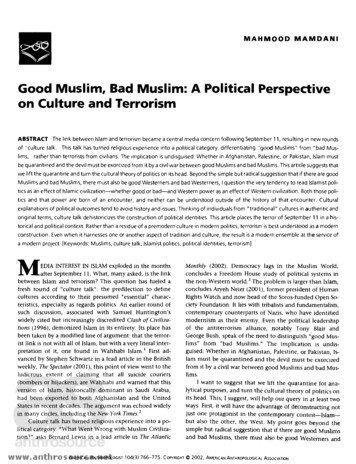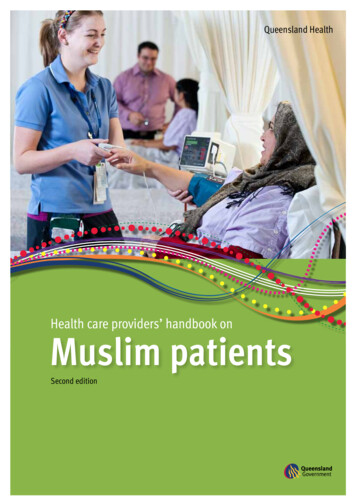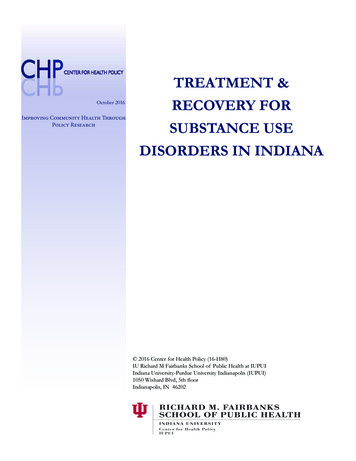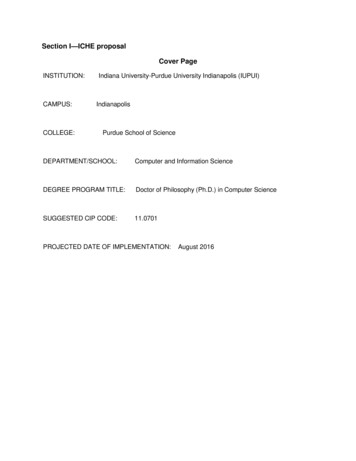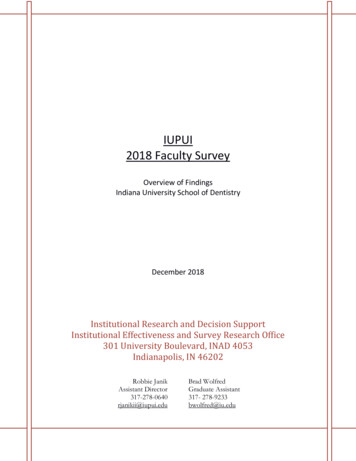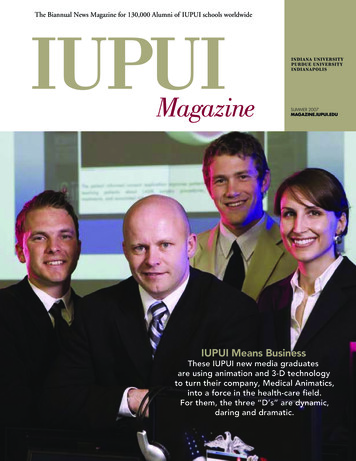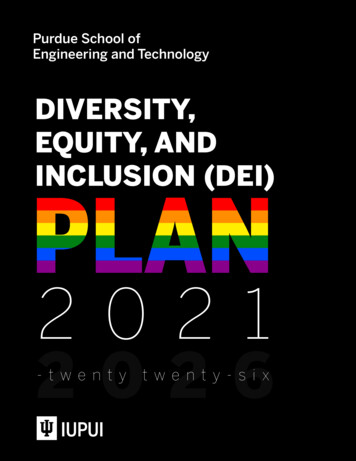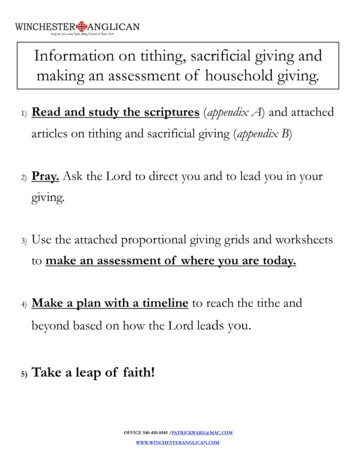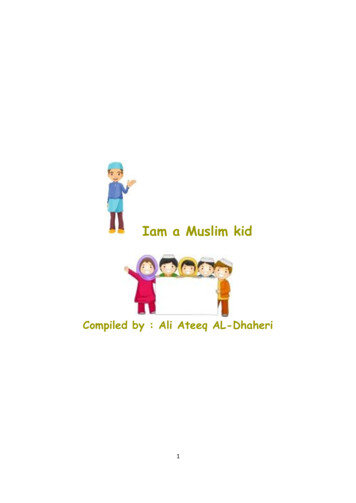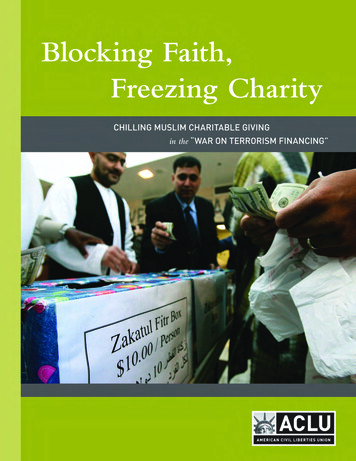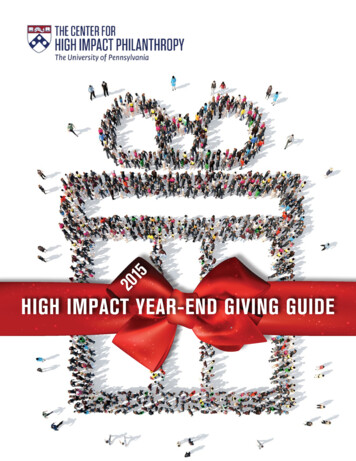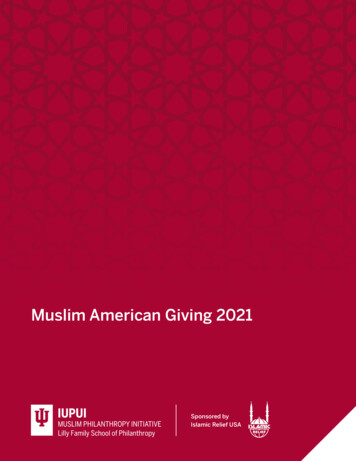
Transcription
Muslim American Giving 2021Sponsored byIslamic Relief USAphilanthropy.iupui.edu1
TA B L E O F C O N T E N T SResearch Team . 3Muslim Philanthropy Initiative (MPI) Team . 4MPI Council of Advisors . 5Acknowledgments . 6About the Lilly Family School of Philanthropy . 7About MPI . 7Executive Summary . 8Introduction . 9Motivations to Give . 11American Muslim Volunteering Within Their Faith Community . 13American Muslim Spending Within Their Faith Community . 15Conclusion . 17Overview . 18philanthropy.iupui.edu2
RESEARCH TEAMShariq SiddiquiShariq is Assistant Professor of Philanthropic Studies and Director of the MuslimPhilanthropy Initiative at the Indiana University Lilly Family School of Philanthropy.Shariq has a Ph.D. and M.A. in Philanthropic Studies from the Lilly Family Schoolof Philanthropy. He also has a JD from the McKinney School of Law at IndianaUniversity and holds a B.A. in History from the University of Indianapolis. Shariqauthors research on Muslim philanthropy and the Muslim nonprofit sector. Mostrecently, he conducted a national survey of full-time Islamic schools in the UnitedStates. This project resulted in the book (that he co-authored) Islamic Education in the United States and theEvolution of Muslim Nonprofit Institutions, published in November 2017. Shariq also serves as the co-editorof the Journal of Muslim Philanthropy and Civil Society, Journal on Education in Muslim Societies and as theSeries Editor of the Muslim Philanthropy and Civil Society Book Series. All three of which are published byIndiana University Press. He has served as a nonprofit practitioner for over 20 years for international, national,regional, and local nonprofit organizations. Previously, Shariq served as the Executive Director of Associationfor Research on Nonprofit Organizations and Voluntary Action (ARNOVA).Rafeel WasifRafeel Wasif is an Incoming Assistant Professor at Portland State University.His research interests include diversity, equity and inclusion in the nonprofitsector with focus on Muslim-American nonprofits. Rafeel’s work has beenpublished or accepted in Nonprofit and Voluntary Sector Quarterly, Voluntas,Nonprofit Management and Leadership, and Nonprofit Policy Forum.Suggested citation: Siddiqui, S and Wasif, R., Muslim American Giving 2021. October 2021. Muslim Philanthropy Initiative at IndianaUniversity Lilly Family School of Philanthropy.philanthropy.iupui.edu3
MPI TEAMShariq Siddiqui JD Ph.D.Abdul SamadAssistant Professor of Philanthropic StudiesGraduate AssistantDirector, Muslim Philanthropy InitiativeCo-Editor-in-chief, Journal of MuslimRafeel Wasif Ph.D.Philanthropy & Civil SocietyPost-doctoral research fellowRafia KhaderLiu YixuanProgram managerGraduate AssistantManaging editor of the Journal of MuslimPhilanthropy & Civil SocietyCamile IrvineFacilitator,Lina GrajalesCommunity Collaboration InitiativeExecutive Assistant to DirectorProject Assistant,Azhar MithaiwalaCommunity Collaboration InitiativeFacilitator,Community Collaboration InitiativeIfeoma AkobiGraduate AssistantAli OttmanFacilitator,Zainab Farhat Ph.D.Community Collaboration InitiativeResearch FellowRoohi YounusTaha HuseinProgram Manager & Facilitator,Graduate AssistantCommunity Collaboration InitiativeMicah Hughes Ph.D.Post-doctoral research fellowAfshan Khan JDVisiting Assistant Professor ofPhilanthropic StudiesGhaida Nael AbdelrahmanGraduate AssistantZeeshan Noor Ph.D.Post-doctoral research fellowphilanthropy.iupui.edu4
MPI COUNCIL OF ADVISORSJunaid AhmedDr. M. Yaqub MirzaSaks TechnologyMirza Family FoundationSterling Management GroupRasheed AhmedZakat Foundation InstituteZeyba RehmanBuilding Bridges ProgramSamar AliDoris Duke Foundation for Islamic ArtBass Berry & SimsKashif ShaikhAbed AyoubPillars FundUnited Mission for ReliefJavaid SiddiqiZahid Cheema MDIslamic Circle of North AmericaNeorologistHelping Hand for Relief and DevelopmentRashid DarTayyab YunusJohn Templeton FoundationIntuitive SolutionsHalil DemirShireen ZamanZakat Foundation of AmericaProteus FundMahmood Hai MDUrologistIltefat Hamzavi MDHamzavi Family FoundationAnwar KhanIslamic Relief USANoorain KhanFord FoundationFarhan LatifElHibri FoundationOusamma MezouiPennyAppeal USAphilanthropy.iupui.edu5
ACKNOWLEDGMENTSWe would like to acknowledge Islamic Relief USA for sponsoring this research and report.We would like to recognize the important support of the Lake Institute on Faith & Giving in this study.We would like to thank the Indiana University Lilly Family School of Philanthropy Research Department for theirassistance with this research project.We would also like to recognize the work of the Institute of Social Policy and Understanding for laying thefoundation for further research on Muslim Americans through their annual American Muslim Poll and theAmerican Muslim Philanthropy: A Data-Driven Comparative Profile.philanthropy.iupui.edu6
A B O U T T H E L I L LY FA M I LY S C H O O L O F P H I L A N T H R O P YThe Indiana University Lilly Family School of Philanthropy at IUPUI is dedicated to improving philanthropy toimprove the world by training and empowering students and professionals to be innovators and leaders whocreate positive and lasting change. The school offers a comprehensive approach to philanthropy through itsundergraduate, graduate, certificate and professional development programs, its research and internationalprograms and through The Fund Raising School, Lake Institute on Faith & Giving, the Mays Family Institute onDiverse Philanthropy and the Women’s Philanthropy Institute. Follow us on Twitter, LinkedIn, or Instagram and“Like” us on Facebook.About MPIThe Muslim Philanthropy Initiative at the Lilly Family School of Philanthropy focuses on understanding andhelping further enhance contemporary and traditional aspects of Muslim philanthropy in all its facets. A projectof the Dean and Lake Institute on Faith and Giving, it convenes scholars and philanthropy professionals toexplore issues and research in the field, hosts symposiums and seminars, and provides education and training.By seeking to further research in this under-studied area, helping to develop thought leadership and informconversations, and training philanthropic and nonprofit leaders within Muslim philanthropy, the initiative helpsbuild capacity in the Muslim philanthropy sector while adding to the body of knowledge about the rich traditionand practice of philanthropy in Islam.philanthropy.iupui.edu7
EXECUTIVE SUMMARYMuslim-Americans have been at the center stage of U.S. political and socio-economic debates in recentyears. Probably the reason being the fastest-growing demographics in the U.S., with around 1.1% of theU.S. population belongs to the Muslim faith as suggested by a 2018 Pew survey. Muslim-Americans arealso one of the most racially diverse groups in the U.S., comprising African-Americans, Asians, Arabs, andCaucasians. Nevertheless, there is a lack of data-driven research about Muslim giving despite their standing.The data and findings from the Muslim American Giving 2021 Study are presented in this study. MuslimPhilanthropy Initiative (MPI) at the Indiana University Lilly Family School of Philanthropy, IUPUI, in collaborationwith the Islamic Relief USA administered this through SSRS. The study surveyed the sentiments of 2,005participants regarding donor behavior, volunteer work, faith customs, attitudes and practices on donation,uncertainty intolerance amidst COVID-19, financial welfare, and sensitivities involved in the donor’s decisionmaking process. SSRS surveyed from March 17 through April 7, 2021.The breakup of the total 2,005 respondents surveyed was a representative sample of 1,002 adult respondentsfrom the general population and a representative sample of 1,003 Muslim respondents. The survey revealed: Muslim philanthropy for both faith-based causes and non-faith-based causes is higher than non-Muslims.Muslims on average gave USD 1,810 to faith-base causes compared to USD 1,138 in the general population.Similarly, an average Muslim gave USD 1,400 to non-faith-based causes compared to USD 767 in thegeneral population.The study also shared important new information of where Muslim Americans donate. Domestic relief equates to 11.13% of Muslim’s faith-based and 16.87% of their non-faith giving in the U.S. Civil rights protections for the members of their community is something in which Muslims spend quitegenerously. On average, Muslims pay nearly 8.47% of their contributions toward faith-based civil rights,compared to 5.31% of the general public. Muslims also are more likely than the general public to give tonon-faith-based civil rights causes (11.87% Muslims versus 5.45% general population). Muslims contribute 27.45% of their faith-based charity to houses of worship. In comparison, the nonMuslim population offers on average 51.28% of their faith-based charity towards the house of worship. Overseas relief and humanitarian causes comprise of 12.81% for faith-based overseas relief and 18.84%for non-faith based overseas relief. The Muslim American Giving 2021 Study also reveals interesting observations about Muslim philanthropyby race, gender, and age. Males donate more than females towards faith-based causes (USD 2,572 vs. USD 698 for faith-basedreasons and USD 1,984 vs. USD 523 for non-faith-causes). Those falling in between the range 40-49 years of age give the highest average charitable giving.Generally, overall, the least amount of giving comes from Muslims above 50.philanthropy.iupui.edu8
MUSLIM AMERICAN GIVING 2021P R E L I M I N A R Y A N A LY S I SIntroductionMuslim-Americans are often at the center of conversations in the U.S. political and socioeconomic sphere.They are also one of the fastest-growing demographics in the U.S., with around 1.1% of the U.S. populationbelonging to the Muslim faith. The 2018 Pew survey projections say that Muslim-Americans are going to be thesecond largest faith in the U.S. by 2040. Muslim-Americans are also one of the most racially diverse groups inthe U.S., comprising Arabs, Asians, African-Americans, and Caucasians among others. Latinos are currentlyone of the fastest-growing Muslim-Americans demographics as well.However, despite their importance, there is limited data-driven research on Muslim giving. There isextraordinarily little data and information available on Muslim philanthropic practices. Given the centrality ofgiving among Muslim communities and the vital role religious giving plays in philanthropy more broadly, it isworth taking a deeper look at how and why American Muslims give.Thousands of organizations nationwide support Muslim communities across a broad spectrum of needs.While some funding for these pursuits flows from outside Muslim communities (both from individuals andfoundations), they are limited; most financing of organizations that support Muslim communities’ uniqueneeds still comes from Muslims themselves. Thus, a deep dive into the philanthropic practices of AmericanMuslims is necessary as we consider the development and strengthening of the communities and theinstitutions that serve them. At the same time, it is also essential to understand the motivations behindMuslim giving, mainly the reasons that may motivate them to giving toward specific causes.philanthropy.iupui.edu9
To this end, the Muslim Philanthropy Initiative at the Indiana University Lilly Family School of Philanthropy surveyin collaboration with Islamic Relief USA included a broad range of studies for uncovering American Muslims’philanthropic practices and motivations. Moreover, this survey is also unique because earlier surveys only lookedat whether Muslims practiced philanthropy and gave to specific causes. This study is the first survey to attemptto understand Muslim charities’ overall extent and scope and assess monetary support toward various causes.This report presents the data and findings from the section on Muslim philanthropy in the Muslim AmericanPhilanthropy Poll. The study was a self-administered web survey conducted by the Indiana University LillyFamily School of Philanthropy. The study investigated the opinions of Muslims and the general populationregarding faith customs, donation practices and attitudes, volunteer work, COVID-19, uncertaintyintolerance, financial well-being, and discrimination. The survey also looked at how Muslims made decisionsabout donations. SSRS surveyed from March 17 through April 7, 2021. Overall, the team surveyed 2,005respondents, including 1,003 Muslim respondents and 1,002 general population adult respondents.Overall, the survey finds that Muslims give more toward both faith- and non-faith-based causes than nonMuslims. Overall, if we extrapolate the overall giving to 3.45 million Muslims (based on Pew Survey), we find thatMuslims gave a guestimate of 4.3 billion USD. Similarly, Muslims gave USD 1,810 to faith-based causes comparedto USD 1,138 in the general population.Again, if we extrapolate the average givingof Muslims to 3.45 million Muslims, we findFaith DonationsNon-Faith Donationsthat Muslims gave USD 2.4 billion towardfaith-based giving. Similarly, an average1,5001,5001,0001,000500500Muslim gave USD 1,400 to non-faith-basedpopulation. If we extrapolate it to 3.45 million,Muslims gave an estimated USD 1.9 billion forUSDcauses compared to USD 767 in the generalnon-faith-based causes.Overall, the report finds that AmericanMuslims give their money and timegenerously in the U.S., much more0MuslimNonMuslim0MuslimNonMuslimthan the average population. Theirphilanthropic patterns and preferencesare well-assimilated with the American landscape and, for the most part, aligned remarkably well with thegeneral public. There are, however, some distinct differences. For instance, Muslims generally spend asmaller proportion of their charity toward houses of worship or mosques (27.45%) compared to the averagepopulation (51.28%). Similarly, Muslims give a more significant proportion of their donations toward overseasrelief and civil rights causes than the average population.philanthropy.iupui.edu 10
Motivations to GiveMotivation is a powerful force in philanthropy, as it compels people to make donation decisions and influencesthe nature and scope of their giving. In Islam, zakat and sadaqah are essential drivers of philanthropic giving.Zakat is a religious obligation whereby Muslims must give away a portion of their wealth to charity, providedthey meet the criteria for wealth. Zakat is one of the five pillars of Islam, second only to the five daily prayersall Muslims must perform. Sadaqah is the term used to signify voluntary charity and can be of any amount.Muslims are obligated to pay zakat on an annual basis. Though there is no specific time to give zakat orsadaqah, it has become an American Muslim tradition to fulfill this giving during Ramadan, the holiest monthfor Muslims, when acts of goodness, like charity, are emphasized.For the question about motivation for charitable giving, the survey asked respondents a series of questions.Figure 1 provides a comparison of American Muslims’ responses with those of the general public. Thestrongest motivations for American Muslims are a feeling of compassion toward people in need (average 4.31out of 5). On the other hand, among the non-Muslim population, the largest motivation was the willingness tohelp others who are less fortunate (3.93). Compared to the general population, Muslims have a more positiveimage of the charitable sector (4.08 versus 3.58). The lowest motivations to give for Muslims and non-Muslimswere getting a tax credit, recognition, financial strain, and the belief that giving money to charities is wasted.Overall, while the mean among Muslims is higher for most motivations, the rankings for motivations amongMuslims and non-Muslims are pretty similar.philanthropy.iupui.edu 11
MuslimsNonMuslimsI donate because I feel compassion toward people in need.4.313.73I donate because I receive a tax credit for charitable contributions.3.082.56Many charitable organizations are dishonest.3.383.05Others with whom I am close place a high value on donating to charities.3.903.19Donating to charity helps me save on my income taxes.3.332.77Donating money to charities would interfere with me meeting myfinancial obligations.3.412.76People should be willing to help others who are less fortunate.4.293.93Much of the money donated to charities is wasted.3.143.06Giving money to charities enables me to reduce my income taxes.3.302.80People I know share an interest in financially supporting charitableorganizations.3.973.26My image of charitable organizations is positive.4.083.58Giving to charities makes me feel powerful.3.782.63Donating money to charities provides too much of a financial strainon me.3.202.78My friends donate to charities.3.983.32Contributing money to charities enables me to obtain recognition.3.492.44I donate money to charities because it makes me feel needed.3.692.93Even if I wanted to donate money to charities, I could not financiallyafford it.3.312.83I give because I am concerned about those less fortunate than myself.4.183.74Motivationphilanthropy.iupui.edu 12
American Muslim Spending Within Their Faith CommunityCivil Rights87.56MuslimNonMuslim0.0PercentageHouse of ious Research60MuslimNonMuslimOverseas th Family Services8644206630092.52Domestic The most crucial cause for the highest percentage of Muslims is their house of worship, as on average, Muslimsgive 27.45% of their faith-based charitable giving toward houses of worship. Still Muslims’ giving towards house ofworships is lower than non-Muslims who give 51.28% of their faith-based charity toward houses of worship. Afterhouses of worship, Muslims report giving the most considerable proportion of their charitable giving toward overseasrelief (12.81%), followed by domestic relief (11.13%). Muslims give a larger proportion of their charitable giving tooverseas relief than average Americans. There is a common belief in the Muslim community that Muslims donatedisproportionately to overseas relief while neglecting the needs of their immediate communities. However, we did notfind any support for this belief. In fact, Muslims’ overall domestic relief giving is very similar to the general population.philanthropy.iupui.edu 13
Muslims Give a High Priority to Civil Rights in Their GivingOne area within their faith community where Muslims spend more than any other faith group is civil rightsprotection for the members of their community. Muslims pay nearly 8.47% of their contributions towardcivil rights, compared to 5.31% of the general public. There is undoubtedly a need for Muslim civil rightsprotection. Muslims continue to find themselves at the heart of national security discussions and often faceracism, xenophobia, and Islamophobia. This finding may also highlight that a relatively high percentage ofAmerican Muslims are immigrants, as half of all American Muslims were born in another country. Successivegenerations of newcomers to the United States faced similar attacks and threats to their civil liberties andhave gone through periods when they had to fight to protect their communities. In that sense, althoughMuslims are outliers in this category at this moment in time, they may be falling in line with well-established(though unfortunate) historical precedents.Perhaps related to this need for civil rights protection, American Muslims also contribute more to researchorganizations that study their community. Muslims, on average, give 6.43% of their contributions towardreligious research, compared to 4.02% of the general population. This finding hints at a link between howmarginalized a religious community is and the need to study that community. While Muslims may be morelikely to support research organizations than other faith communities, it is the least funded work area, despitethe clear need.philanthropy.iupui.edu 14
Giving Preferences: Non-Faith-BasedCivil 0MuslimNonMuslimInternational Relief15105.01052.50.0Domestic imNonMuslimYouth Family garding non-faith-based giving, Muslims gave a larger proportion of their donations to overseas relief,civil rights, COVID-19, and the environment than non-Muslims. In contrast, non-Muslims gave more thanMuslims to domestic relief and healthcare. American Muslims provide the largest proportion of their charity tooverseas relief (18.84%). The finding is higher than the general population, which on average gives 12.05% oftheir donations to this cause. This finding closely follows domestic relief (16.87%), which is slightly lower thanthe average by the general population (19.76%).philanthropy.iupui.edu 15
American Muslims, a sizable proportion of which are immigrants, might be expected to spend more on theircountries of origin. But our data reveals that Muslims also give generously toward local causes. By giving to avariety of secular or faith-based nonprofits outside their faith tradition, American Muslims are more likely togive toward fighting domestic poverty than to overseas relief.American Muslims are also more likely than other groups to give to civil rights organizations (11.87% Muslimsversus 5.45% of the general population) outside their faith community. These statistics suggest that perhapsthe experiences of discrimination may incentivize Muslims toward giving not only to their faith communitiesbut also to help other marginalized communities.Muslim-Americans also gave more toward COVID relief (14.26%) even for non-faith causes than the averagepopulation (6.65%). On the other hand, American Muslims spend less on youth and family services (11.35%)and healthcare (10.65%) outside their faith community than the general public (12.96% and 13.25%,respectively). Coupled with a similarly low rate of spending in this category within their faith community, itbecomes apparent that youth and family services and healthcare are not a high priority for charitable giving.Muslim Philanthropy by Race, Gender, and AgeFaith DonationsSome interesting findings emerged when we pareddown the data on Muslim philanthropy from theAmerican Muslim Poll 2021 on gender, age, and2,000(USD 2,572 vs. USD 698 for faith-based reasons andUSD 1,984 vs. USD 523 for non-faith-causes).Percentagerace. Overall, we find that males give significantlymore than females toward faith-based causesNon-Faith Donations2,0001,5001,0001,000500In most of the categories covered by the survey,there were no significant differences along gender0lines among Muslims. The only two categoriesFemale0MaleFemaleMaleGenderwhere a gender difference emerged were onhouses of worship. Muslim women give a largerproportion of their giving toward houses of worship than men (32% vs. 26%). Overall, in terms of non-faithgiving, we did not find any major differences between the genders.AgeIn general, based on age, Muslims in the 40–49 age bracket have the highest average charitable giving.Overall, the least amount of average faith-based giving comes from Muslims above 50. This finding suggeststhat nonprofit organizations need to include more younger and older people in their philanthropy efforts.philanthropy.iupui.edu 16
There are some differences in giving prioritiesby age. For instance, Muslims between 55–64Faith DonationsNon-Faith Donationsand 65 provide a much higher proportion of2,000their giving toward international relief (65% and2,000(6% and 4%, respectively). Interestingly, Muslim18–29 year olds give a smaller proportion toward1,500USD17%, respectively) than the general population1,0001,000international relief (21%) than those in the general500population (35%). Predictably, older Muslimsare more likely to give a higher proportion of00their giving toward healthcare (22% and 28%,respectively, for 55–64 and 65 ).AgeRaceFaith DonationsWhite Muslims give the highest amounts ofcharity among racial groups on average toward2,000faith and non-faith causes. White Muslim giving isHowever, there are some noteworthy findings.For instance, African-Americans give the largestproportion of their giving towards House ofWorship (65.1%) when compared to other racial1,5001,500USDfollowed by Hispanics, Arabs, Asians, and mixed.Overall, the racial giving patterns are similar.Non-Faith Donations1,0001,00050050000Racegroups, and also give more towards both faithbased civil rights (14.5%) and non-faith based civilrights (13%). Similarly, Arab and Asian Muslims give a higher proportion of their giving towards both faith-basedinternational relief (19.8% for Arabs and 15.1% for Asians) and non-faith international relief (30.3% for Arabs and21.7% for Asian Muslims).ConclusionPhilanthropy is a crucial part of the Muslim faith. This survey reveals that Muslims are overall more generousthan the general population not only for faith-based but also for non-faith-based causes. Muslims not onlydonate toward their house of worship but also for several other primary reasons, including those targetedtoward poverty, as well as civil rights. However, Muslim philanthropy is not monolithic in any way. The surveyreveals that there are significant differences along gender and racial lines. These findings attest to thediversity within Muslim-Americans, an important issue for research in the future.philanthropy.iupui.edu 17
OVERVIEWThe Muslim American Giving Study was a self-administered web survey conducted by SSRS for the Indiana UniversityLilly Family School of Philanthropy. The study investigated the opinions of Muslims and the general populationregarding faith customs, donation practices and attitudes, volunteer work, covid, uncertainty intolerance,financial well-being, and discrimination. The survey was conducted from March 17 through April 7, 2021.A total of 2,005 respondents, 1,003 Muslim respondents and 1,002 general population adult respondents, age18 were surveyed. Eligible respondents were reached via nonprobability panel sample.This report details the methodological components of the study, including: sample design, questionnairedesign, programming, data collection, data processing, and weighting.Sample DesignThird-party nonprobability panels were utilized to reach respondents. Panelists in the required Muslim religionwere invited to participate in this online survey for the Muslim portion. The general population respondentscould be any religion/no religion. To be eligible to complete the survey, a respondent had to be age 18 and livein the United States. General population respondents were sourced from Dynata, a commercial web sampleprovider. Muslim respondents were sourced from a combination of Dynata, Lucid, and MarketCube.Questionnaire DesignThe questionnaire was developed by the Indiana University Lilly Family School of Philanthropy in consultationwith the SSRS project team. Prior to the field period, SSRS programmed the study into Confirmit for the web.Extensive checking of the program was conducted to ensure that skip patterns and sample splits followedthe design of the questionnaire. SSRS project directors checked randomly generated data as an additionalconfirmation of program accuracy.The final questionnaire is included in the Appendix at the end of this document.Data CollectionSoft LaunchThe Muslim American Giving Study “soft launch” took place on March 17-18, 2021, inviting a limited numberof panelists to participate. A total of 218 interviews were collected, 115 with Muslim respondents and 103with general population respondents. Data was checked for program accuracy and for length. Further emailinvitations and reminders were sent throughout the field period.Survey AdministrationThe Muslim American Giving Study was self-administered on the web and took approximately 11 minutes for
published or accepted in Nonprofit and Voluntary Sector Quarterly, Voluntas, Nonprofit Management and Leadership, and Nonprofit Policy Forum. Suggested citation: Siddiqui, S and Wasif, R., Muslim American Giving 2021. October 2021. Muslim Philanthropy Initiative at Indiana University Lilly Family School of Philanthropy.
